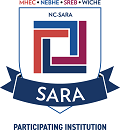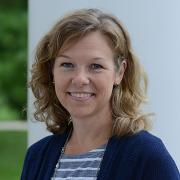
About this Program
The online multidisciplinary studies in education program consists of a thoughtful balance of courses, purposefully designed to deliver high-quality learning experiences while accommodating the busy schedule of teaching professionals.
Program Overview
Tuition & Fees
Funding Opportunities
Download Multidisciplinary Studies Brochure
National Board Certification Prep Program
Relevant. Credible. Fully online.
To successfully meet the needs of students in today’s public schools, an educator must have a much broader pedagogy than what was needed in past generations. A multidisciplinary studies in education master’s degree will satisfy many early career needs of today’s educator by:
• Providing the essential knowledge and in-demand skills needed for today’s diverse classrooms.
• Increasing knowledge in designing curriculum, implementing research-based instructional strategies and developing leadership capacity.
• Providing flexibility in designing a plan of study suited to one’s individual academic and professional goals.
Class are offered fully online, which provides students with flexibility and the convenience of working at home, while still allowing students and faculty to engage in rich conversations about teaching and learning. Our small class sizes and discussion-based courses encourage high levels of engagement.
The multidisciplinary studies program earns its name from the unique course sequence that allows graduate students to take courses across three educational programs (curriculum and instruction, reading specialization and educational leadership). Students also complete foundational classes focusing on topics such as curriculum, technology, diversity and educational research. Finally, with adviser approval, students have the option to select courses from graduate programs in other disciplines to create a highly individualized program that aligns with career goals.
Our expert faculty and adjuncts are accomplished professionals in the field of education. Courses balance theory and practice in order to provide relevant, purposeful experiences that address current topics in education.
All graduate students in the multidisciplinary studies in education program are required to have regular access to a PreK-12 classroom throughout their program in order to successfully complete course assignments and the capstone research project. Students who are not currently teaching may work with a local school to volunteer or observe in a classroom. Applicants are responsible for meeting all requirements for school volunteers, as determined by the individual school and/or district. Please note that this program does not lead to teacher certification.
The Hood Education Department is recognized by the Maryland State Department of Education as an approved educator preparation program provider.
Student & Alumni Testimonials
"Hood College gave me opportunities to expand my horizon by welcoming challenge and change—especially by working with students of all age levels." -Laurene Carlisle, M.S.'03
Please note the Multidisciplinary Studies in Education master's program is not open to F1 students.

Hood College participates in the State Authorization Reciprocity Agreements.
Degrees Offered
- MS
Are you ready to go further?
For students applying to the multidisciplinary studies in education M.S. program, please submit the following to the Graduate School:
- Online graduate application.
- One copy of official transcripts from the institution where the highest degree was conferred.
- A short essay (approx. 500 words) describing how you anticipate the multidisciplinary studies in education graduate program will benefit you and your professional goals.
- Interview with program director.
Transfer credit policy for admitted students
Students may transfer a maximum of 6 graduate credits from an external, accredited institution, or another Hood graduate program prior to the first semester of study in the current program. Please review the full graduate transfer credit policy in the College catalog.
Earn Hood graduate credits as a non-degree student or apply them toward a related master's degree in education while completing the FCPS Vanguard Program.
This partnership program between the Frederick County Public School System and Hood College will teach, lead and coach others to create a blended learning environment in the classroom, while building capacity within schools and across the district.
Mindset
Mindset competencies include the core values or beliefs that guide an individual’s thinking, behaviors and actions, which align with the goals of educational change and mission. Educators need to commit to mindsets that help them shift toward new forms of teaching and learning.
Instructional Technology
Instructional technology skills help educators utilize technology in their lessons. The goal is to transform learning experiences so they result in higher levels of achievement for students. These skills are acquired and mastered through instruction, training and practice.
Teaching Practices
Teaching practice competencies are personal characteristics and patterns of behavior that help educators make the transition to new ways of teaching and learning. These qualities include integrating digital content, small group instruction, opportunities for student reflection and data-driven decision making.
Professional Learning and Networking
Professional learning and networking skills are general skills that apply across roles and subject areas. These skills—which include collaboration and problem solving—are complex; they help practitioners tackle new tasks or develop solutions in situations that require organizational learning and innovation.
18-24 Months
Average Completion Time
36 Total Credits
Program Contact

Program Director

Assistant Director of Graduate Admission





